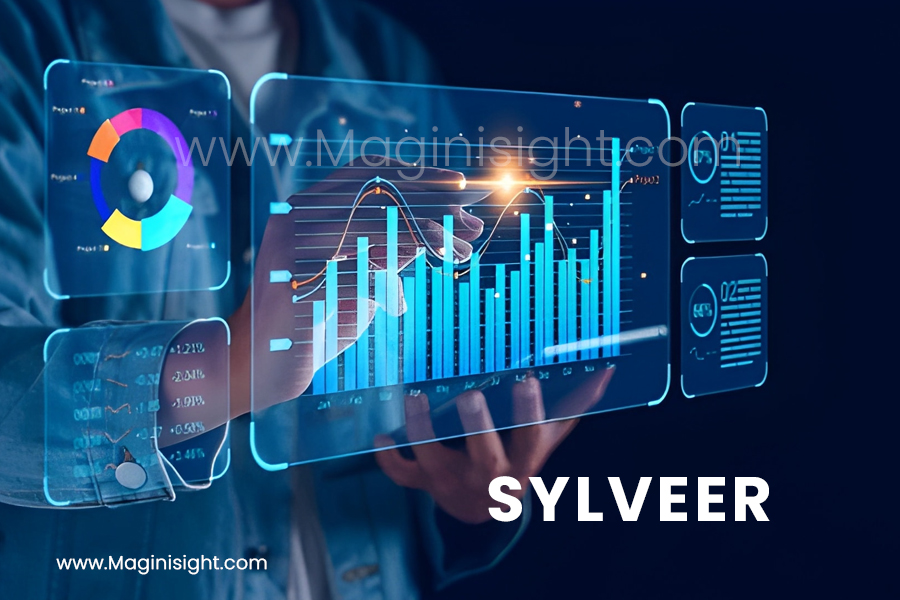Sylveer is a next-generation sustainability-driven business platform that empowers organizations to operate more efficiently while minimizing their environmental footprint. Designed to merge technology, data intelligence, and sustainable innovation, Sylveer provides a unified framework that helps companies transform traditional operations into smarter, greener, and more socially responsible systems.
In simple terms, Sylveer is not just a software solution — it’s a strategic sustainability ecosystem. It enables businesses to integrate eco-conscious decision-making into every aspect of their operations, from supply-chain management and energy use to workforce engagement and brand impact. By aligning profit with purpose, it allows enterprises to remain competitive in a rapidly changing world where sustainability is no longer optional — it’s essential.
Through data analytics, automation, and collaborative design, Sylveer helps organizations monitor carbon emissions, optimize energy consumption, reduce waste, and build transparent sustainability reports. Its core philosophy is rooted in one guiding belief: progress and sustainability can coexist when innovation is led by responsibility.
The Meaning and Purpose of Sylveer
At its heart, Sylveer embodies a movement — one that unites the goals of economic growth and environmental preservation. The platform’s main purpose is to help companies transition from linear, resource-intensive operations to circular, efficient, and regenerative business models.
Sylveer achieves this by connecting digital intelligence with ecological awareness. Every decision within the platform is guided by metrics that reflect both performance and planet-positive outcomes. Businesses using Sylveer gain access to real-time dashboards that reveal their environmental impact, energy efficiency, and operational health, enabling them to make adjustments that benefit both their bottom line and the world around them.
This dual focus on profitability and planet distinguishes Sylveer from conventional business systems. It recognizes that sustainability isn’t a side project — it’s a competitive advantage that enhances brand trust, investor confidence, and customer loyalty.
The Evolution of Sustainability in Modern Business
To fully appreciate the innovation behind Sylveer, it’s important to understand how sustainability has evolved in the business world.
A decade ago, environmental responsibility was often seen as a compliance requirement or a marketing tool. Today, it’s a strategic necessity. Investors demand ESG (Environmental, Social, and Governance) transparency; consumers favor brands that reflect their values; and governments are tightening regulations on emissions and waste.
Businesses that ignore sustainability risk falling behind — not only ethically, but economically. That’s where Sylveer enters the picture. By embedding sustainability into the operational core, it allows companies to move beyond slogans and toward measurable, verifiable progress.
In the digital age, where data drives every decision, Sylveer uses technology to turn sustainability into something tangible and trackable. Through its advanced analytics and AI-driven insights, companies can visualize how every policy, process, and purchase affects their environmental outcomes — empowering leadership to make choices that matter.
How Sylveer Bridges Efficiency and Environmental Responsibility
One of the most powerful features of Sylveer is its ability to align operational efficiency with environmental stewardship. Traditionally, businesses viewed sustainability as an expense — something that slows down production or increases costs. Sylveer proves the opposite.
By integrating automation, predictive analytics, and smart-resource allocation, it helps organizations reduce waste, cut energy costs, and streamline workflows. For instance, manufacturers can use Sylveer’s insights to optimize material use, logistics companies can minimize carbon emissions through route optimization, and retailers can manage sustainable sourcing more effectively.
Each improvement, though small in isolation, contributes to a larger system of circular efficiency — where less waste equals more value. Sylveer’s data-driven ecosystem ensures that businesses not only meet sustainability targets but also enhance productivity, resilience, and long-term profitability.
In this sense, Sylveer acts as a digital sustainability compass, guiding organizations toward decisions that make sense economically, ethically, and ecologically.
The Philosophy Behind Sylveer
Behind every innovative platform lies a philosophy — and Sylveer’s philosophy is built on balance, integrity, and innovation.
Sylveer operates on the principle that true innovation must serve humanity and the planet equally. This belief stems from a growing recognition that global challenges such as climate change, biodiversity loss, and resource scarcity cannot be solved through isolated efforts. They require integrated solutions where technology amplifies human responsibility.
This is why Sylveer was designed not as a one-size-fits-all product, but as a modular sustainability framework adaptable to diverse industries. Whether it’s energy, manufacturing, retail, or education, the system tailors sustainability metrics to match each sector’s unique needs.
The philosophy extends beyond tools and data — it’s about empowerment. It encourages leaders to see sustainability not as a corporate obligation but as a source of inspiration and innovation. It nurtures creativity in problem-solving, inviting organizations to explore how sustainable thinking can unlock new market opportunities and long-term stability.
In essence, Sylveer is built on three philosophical pillars:
-
Transparency – measurable impact through verifiable data.
-
Collaboration – collective progress through partnerships.
-
Innovation – technology as a bridge between growth and responsibility.
Core Principles and Framework of Sylveer
The Sylveer framework is composed of interconnected principles that guide its operation. Each principle supports the platform’s broader mission of transforming sustainability into an achievable and measurable business reality.
1. Circular Design Thinking
Sylveer encourages companies to adopt circularity — where materials, energy, and ideas continuously flow back into the system. Instead of the traditional “take-make-waste” model, Sylveer promotes reuse, recycling, and regeneration, helping businesses redesign processes from the ground up.
2. Data-Driven Sustainability
One of Sylveer’s defining features is its analytics-first approach. By collecting data from operations, logistics, and supply chains, it translates environmental performance into actionable insights. Decision-makers can view their sustainability metrics in real time, track emissions, measure energy efficiency, and forecast outcomes.
3. Integrated Collaboration Tools
Sylveer fosters cross-department collaboration. It provides shared dashboards and communication tools so teams — from sustainability officers to finance managers — can work toward the same goals. This transparency enhances accountability and accelerates sustainability progress across departments.
4. Adaptive Intelligence
Through machine learning and AI, Sylveer adapts to changing conditions and learns from business patterns. For example, it can predict when equipment maintenance will optimize energy use or suggest alternative suppliers with lower carbon footprints.
5. Compliance and ESG Alignment
Sylveer simplifies regulatory compliance by aligning its data architecture with global ESG and SDG frameworks. This means organizations can automatically generate sustainability reports that meet international standards while ensuring credibility with stakeholders and investors.
6. Human-Centric Design
While Sylveer is technology-powered, it’s fundamentally human-focused. It’s designed to empower individuals — from executives to employees — to participate in sustainable transformation. Its intuitive design encourages behavioral change by making sustainability both understandable and actionable.
Applications, Benefits, and Integration of Sylveer
How Sylveer Transforms Business Operations
The real power of Sylveer lies in how it reshapes the way organizations function. Rather than adding sustainability as an afterthought, Sylveer embeds it directly into the operational DNA of a business. This integration helps leaders rethink how they produce, consume, and distribute resources.
Every feature of the platform — from data analytics to AI-powered modeling — serves one purpose: to make sustainability practical, measurable, and profitable. Companies can assess their current performance, predict the environmental impact of future decisions, and identify the most efficient ways to reduce waste while maintaining productivity.
For example, in a manufacturing context, Sylveer helps track energy use, optimize raw material consumption, and even detect inefficiencies in production cycles. In retail or logistics, it assists with sustainable supply-chain management, recommending greener transportation routes or ethical sourcing partners.
This holistic view transforms sustainability from a moral choice into a strategic business decision, proving that responsible operations can drive both innovation and revenue growth.
Sylveer and Digital Transformation
In the modern digital economy, transformation is no longer optional — it’s survival. Sylveer plays a crucial role in this transformation by connecting sustainability with digital intelligence.
Businesses are increasingly relying on cloud computing, automation, and data analytics to remain competitive. Sylveer integrates seamlessly into these systems, acting as the sustainability layer that ensures digital transformation doesn’t come at the cost of the planet.
Through smart integrations with existing enterprise tools, Sylveer provides a single dashboard that merges environmental data with performance metrics. Decision-makers can view everything — from carbon emissions to cost efficiency — in one intuitive platform.
Moreover, Sylveer leverages predictive analytics to forecast future outcomes. For instance, it can analyze data trends and alert companies when their energy consumption is about to exceed sustainable thresholds. This foresight enables organizations to make timely adjustments, reducing risk and improving long-term sustainability.
The platform’s adaptability ensures it can evolve alongside technological progress. Whether integrated with IoT systems, AI-driven logistics, or blockchain-based supply chains, Sylveer acts as the connective tissue linking innovation with environmental consciousness.
Sustainable Innovation Through Data and AI
Innovation thrives on insight — and Sylveer uses data as the fuel for smarter, cleaner innovation. Its AI-driven framework processes vast amounts of data from multiple sources to identify opportunities for improvement.
Here’s how Sylveer applies data and AI to drive sustainability:
-
Predictive Environmental Modeling:
Using advanced algorithms, Sylveer can predict the environmental outcomes of proposed business activities. This helps organizations plan strategies that are both profitable and eco-friendly. -
Smart Resource Allocation:
The platform analyzes usage patterns to recommend how resources — energy, water, materials — can be optimized without compromising quality or output. -
Sustainability Benchmarking:
By comparing a company’s performance against industry standards and global goals, it offers customized recommendations to help close the sustainability gap. -
Carbon Tracking and Reporting:
Businesses can automatically track emissions, measure reductions, and generate accurate carbon reports for investors, partners, and customers.
Through these intelligent systems, Sylveer shifts sustainability from a conceptual ideal to a data-backed practice. This not only improves transparency but also inspires innovation rooted in real results.
Benefits of Sylveer for Businesses
Sylveer offers a wide range of benefits for businesses that go beyond environmental compliance. Its comprehensive design helps companies create value across every aspect of their operations.
1. Enhanced Efficiency
By minimizing waste, automating workflows, and improving resource use, Sylveer enables organizations to lower costs while boosting productivity. Efficiency is no longer just operational — it becomes sustainable.
2. Stronger Brand Reputation
Modern consumers expect brands to stand for something meaningful. Companies using Sylveer can showcase real sustainability achievements backed by verified data, enhancing their credibility and attracting conscious customers.
3. Investor and Stakeholder Confidence
With the global shift toward ESG investing, transparency is vital. Sylveer’s clear reporting tools make it easier for businesses to communicate measurable progress, building investor trust and securing long-term support.
4. Regulatory Compliance
Sylveer simplifies compliance with environmental standards, local laws, and international sustainability frameworks. Its built-in templates and automated reports save time and reduce the risk of penalties.
5. Innovation and Adaptability
By promoting sustainable creativity, Sylveer inspires teams to design better products, reduce waste, and explore circular business models — helping organizations stay relevant in an evolving market.
6. Long-Term Cost Reduction
While sustainability investments may seem expensive initially, Sylveer demonstrates that sustainable practices actually lower costs over time through efficiency and reduced resource dependency.
Sylveer in Different Industries
The versatility of Sylveer makes it suitable for a wide range of industries. Its customizable structure allows organizations to tailor sustainability strategies to their sector-specific challenges.
Manufacturing
In manufacturing, Sylveer tracks production efficiency, material sourcing, and energy consumption. It identifies waste-heavy processes and provides solutions for resource optimization — helping companies achieve cleaner production lines without sacrificing output.
Retail and Supply Chain
For retail and logistics, Sylveer ensures transparency in sourcing, transportation, and packaging. By integrating with supplier networks, it allows businesses to verify ethical sourcing, reduce carbon-intensive routes, and minimize packaging waste.
Technology and IT
Tech companies use Sylveer to monitor data center energy use, improve hardware recycling, and optimize energy efficiency in cloud operations — ensuring digital progress aligns with green principles.
Education
In the education sector, it provides a platform for institutions to track sustainability goals, reduce energy use in campuses, and educate students about environmental accountability through data-driven learning.
Finance and Investment
Financial firms integrate Sylveer to track ESG metrics, manage green portfolios, and support responsible investing strategies. It ensures that sustainability performance is both measurable and profitable.
Case Examples and Hypothetical Scenarios
While Sylveer’s versatility extends across industries, its true value comes to life in real-world applications. Let’s explore a few hypothetical examples that showcase its impact.
Example 1: Sustainable Manufacturing
A mid-sized electronics manufacturer integrates Sylveer to monitor supply-chain emissions. Within a year, it identifies inefficiencies in material transport routes and switches to a local supplier network. The result? A 25% reduction in carbon footprint and 10% improvement in delivery speed, all verified through Sylveer’s analytics dashboard.
Example 2: Green Retail Transformation
A global retail chain uses Sylveer to evaluate its packaging and waste management systems. Through AI analysis, the company transitions to biodegradable materials, saving millions in disposal costs and boosting customer loyalty.
Example 3: Smart Campus Initiative
A university adopts Sylveer to manage energy consumption across multiple campuses. The platform helps track heating, lighting, and water usage — reducing operational costs by 15% while achieving national sustainability certifications.
These cases demonstrate how Sylveer turns sustainability goals into measurable, profitable outcomes, proving that responsible business can also be the most efficient.
How Sylveer Enables Long-Term Growth
Growth in the 21st century is about more than expansion — it’s about resilience and adaptability. Sylveer provides the foundation for both.
By helping organizations align with sustainability targets, Sylveer ensures they remain compliant, efficient, and future-ready. Its predictive analytics and adaptive AI allow companies to anticipate changes in market demand, environmental policy, and resource availability.
Moreover, Sylveer fosters a culture of innovation. Teams empowered with real-time sustainability data are more likely to experiment, collaborate, and design forward-thinking solutions. This not only drives product innovation but also strengthens internal engagement and employee morale.
Ultimately, Sylveer creates a growth model that thrives on balance — where environmental care fuels economic advancement. Businesses using Sylveer are not just growing; they’re evolving into sustainable leaders shaping a greener economy for future generations.
The Future of Sustainability and Innovation with Sylveer
Sylveer and the Global Sustainability Movement
In the global movement toward sustainability, Sylveer stands as a pivotal platform bridging innovation, responsibility, and growth. It represents a shift from traditional corporate environmental efforts — often reactive and fragmented — to proactive, data-driven, and scalable solutions.
Around the world, governments, organizations, and consumers are demanding more transparency and measurable results in environmental management. Sylveer responds to this demand by providing the tools, frameworks, and analytics needed to track real progress.
Its influence extends far beyond corporate walls. By aligning with global sustainability frameworks such as the United Nations Sustainable Development Goals (SDGs) and ESG (Environmental, Social, and Governance) standards, Sylveer ensures that every organization using the platform contributes meaningfully to the planet’s long-term health.
This alignment with international standards gives Sylveer global relevance — enabling cross-border collaboration between industries, investors, and regulators. As sustainability becomes the new competitive advantage, Sylveer is positioned to become a cornerstone in the global green economy.
Key Challenges in Implementing Sylveer
While the benefits of Sylveer are extensive, integrating such a transformative platform into established systems doesn’t come without challenges. Businesses often face several barriers when shifting toward sustainability-driven operations.
1. Initial Investment and Technological Adaptation
Many organizations perceive sustainability tools as expensive or difficult to implement. While Sylveer’s AI-powered systems provide long-term returns, the initial setup — such as integrating data sources, training staff, and aligning existing software — requires planning and investment. However, these early costs typically yield significant long-term savings through efficiency and waste reduction.
2. Cultural Resistance to Change
Corporate culture can be a major obstacle. Employees accustomed to traditional workflows may resist new systems or view sustainability as an additional burden rather than a shared value. To address this, Sylveer encourages employee engagement programs, sustainability training, and leadership communication — ensuring that every team member understands the vision and participates actively in the transformation.
3. Data Integration Complexity
For large organizations, consolidating multiple data streams (from logistics, production, and energy systems) can be complex. Sylveer mitigates this challenge with modular integration tools that connect seamlessly with existing ERP, CRM, and analytics platforms — simplifying the transition without disrupting daily operations.
4. Measuring Intangible Impact
Sustainability isn’t always quantifiable through profit alone. Sylveer helps solve this by translating environmental progress into tangible, visual metrics — such as reduced emissions, improved efficiency percentages, and verified ESG performance — helping organizations demonstrate both moral and financial value.
How Sylveer Overcomes These Challenges
The true strength of Sylveer lies in its flexibility. Designed with scalability and adaptability at its core, it fits organizations of all sizes — from startups to multinational enterprises.
-
Phased Implementation:
Businesses can adopt Sylveer in stages, focusing first on key departments before expanding company-wide. This gradual rollout allows smoother integration and faster ROI. -
Comprehensive Training Modules:
Sylveer offers intuitive training and support programs that help employees understand the importance of sustainable operations and how to use data effectively. -
Automated Reporting and Compliance:
By automating compliance reports and sustainability dashboards, Sylveer reduces manual workload and human error, ensuring accuracy in every sustainability claim. -
Collaborative Ecosystem:
Sylveer promotes collaboration between teams, departments, and external partners. This cross-functional communication strengthens company culture while fostering innovation.
These solutions demonstrate how Sylveer isn’t just software — it’s a change management ecosystem designed to make sustainability achievable, practical, and rewarding.
Technological Evolution: The Future of Sylveer
As technology advances, Sylveer continues to evolve, integrating the latest tools to drive smarter and greener business operations. Its roadmap embraces emerging innovations like Artificial Intelligence (AI), Internet of Things (IoT), Machine Learning (ML), and Blockchain, each enhancing different aspects of sustainability.
1. Artificial Intelligence for Predictive Insights
Sylveer uses AI not just to analyze current performance but also to predict future outcomes. For instance, it can anticipate energy consumption spikes, detect potential supply chain inefficiencies, or forecast environmental risks — giving companies time to act before problems escalate.
2. IoT Integration for Real-Time Monitoring
Through IoT integration, Sylveer connects directly with on-site sensors, devices, and production systems. This allows real-time tracking of energy usage, emissions, and material flow, turning sustainability data into live performance metrics.
3. Blockchain for Transparency
To ensure accountability, Sylveer incorporates blockchain for verifiable sustainability reporting. Each sustainability milestone — from reduced emissions to ethical sourcing — can be recorded immutably, building trust with consumers and investors.
4. Machine Learning for Continuous Optimization
ML enables Sylveer to improve with use. As more data flows through the system, the platform learns from historical patterns, refining recommendations for energy efficiency, waste management, and cost optimization.
5. Cloud-Based Scalability
Built on cloud infrastructure, Sylveer offers global scalability. Businesses can operate seamlessly across regions, maintaining consistent environmental standards regardless of size or geography.
These advancements ensure that Sylveer remains future-ready — a living, learning system that grows alongside technological and environmental evolution.
Sylveer’s Role in Shaping Green Business Models
Traditional business models focused primarily on output and profit. Sylveer, however, inspires a new approach — one where environmental care, innovation, and growth coexist.
It encourages circular economy principles, where products and materials are reused, recycled, or repurposed rather than discarded. This reduces waste and strengthens long-term profitability.
Moreover, Sylveer supports companies in transitioning toward net-zero emissions, offering tools that calculate, monitor, and offset carbon footprints effectively. These features not only boost environmental credibility but also attract eco-conscious investors and customers.
Through its strategic insights, Sylveer helps companies develop sustainable products and services — opening new market opportunities while minimizing ecological harm.
By turning sustainability into a core business strategy instead of a compliance task, it ensures that companies stay relevant and resilient in a rapidly changing economy.
Collaboration and Community Engagement
Beyond technology, Sylveer recognizes that true sustainability thrives on collaboration. The platform fosters a community-driven approach where companies, suppliers, and consumers collectively contribute to a shared environmental vision.
Through its collaborative ecosystem, Sylveer enables:
-
Supplier Partnerships: Businesses can work directly with suppliers who share the same ethical and environmental standards.
-
Cross-Industry Collaboration: Organizations can share best practices and co-develop sustainability innovations.
-
Consumer Involvement: Transparency tools allow customers to trace the lifecycle of products, building loyalty and trust.
-
Educational Programs: Sylveer supports universities and institutions in using its platform to teach sustainability management and digital innovation.
This interconnected model amplifies the global impact of every sustainability effort, transforming isolated actions into a network of collective progress.
Sylveer and the Future Workforce
The next generation of professionals is increasingly driven by purpose and sustainability. Sylveer aligns perfectly with this shift.
By providing tools that blend technology, creativity, and environmental awareness, it equips future leaders with the skills needed to balance business objectives with ecological stewardship.
Organizations that adopt Sylveer not only future-proof their operations but also attract top talent eager to make a positive impact. In doing so, they foster a motivated, purpose-driven workforce committed to long-term environmental success.
Long-Term Vision: A Green and Tech-Driven Future
Looking ahead, Sylveer aims to become the universal standard for sustainability-driven management — an ecosystem that unites technology, ethics, and economics.
Its vision is to create a world where:
-
Businesses measure success not only by profit but also by their positive environmental impact.
-
Every decision — from production to marketing — is informed by sustainability data.
-
Innovation leads to regeneration, not depletion.
In this envisioned future, Sylveer is not just a platform but a philosophy of progress — one that inspires organizations to build a world where growth and responsibility exist in harmony.
Conclusion
In a world where sustainability is no longer optional but essential, Sylveer stands as a guiding force for a new generation of businesses — ones that believe profitability and responsibility can thrive together.
More than a platform, Sylveer is a movement — one that transforms sustainability from a corporate checkbox into a strategic advantage. It empowers organizations to measure, manage, and magnify their environmental impact using intelligent data, predictive analytics, and collaborative design. By merging technology with purpose, it helps companies evolve from reactive to regenerative — where every decision contributes to both economic growth and planetary well-being.
As industries worldwide race toward carbon neutrality and ethical innovation, it offers the blueprint for lasting transformation. It turns complexity into clarity, ambition into action, and data into progress. Businesses that adopt Sylveer aren’t just adapting to change — they’re leading it.
Ultimately, Sylveer represents the future of business itself: smart, sustainable, and socially conscious. It proves that when innovation is guided by integrity, growth becomes not only possible but profoundly impactful — for companies, communities, and the planet we all share.
Don’t miss out on any news—keep in touch for real-time information. Mag Insight!








